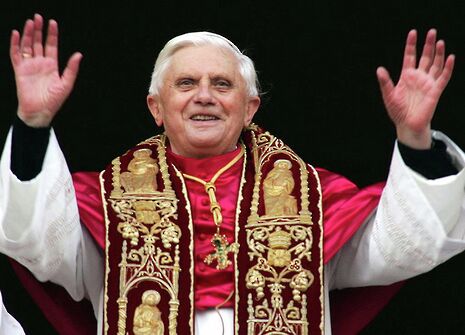Debate Part 1: Pope Benedict – the Church’s beloved shepherd
Joseph Ataman looks back at the legacy of Pope Benedict on the day he retires, the first Pope to do so in 600 years.

For a world of fleeting moments, transfixed by little, the only real marker of great people seems to be the legacy they leave in their wake. Within hours of Pope Benedict XVI announcing his retirement from his seat in the Vatican, the Internet was aflame with voices clamouring to define the mark that he had made on the world. For Pope Benedict’s eight years at the helm of the Vatican, he has rarely been out of the global public eye, in a papacy marked by both its brevity and the considerable age of Cardinal Ratzinger, when he was elected in 2006. Undoubtedly the first papal retirement in nearly 600 years will fix a place for Pope Benedict in history, a position which he neither looked for, nor one which does justice to a Pope whose most valuable contributions will surely be lost in the furious passage of time.
These have been difficult days for the Catholic Church, as it has come to terms with the decline of Christian religion across Europe and as the skeletons of child-abuse have finally been brought to life. Only days before the death of John Paul II, the then Cardinal Ratzinger referred to the “filth” besmirching the Catholic Church, a thinly veiled attack on the abuses that he knew would haunt the next Pope. However difficult the past years have been Pope Benedict did not shy from tackling the issue head on. His full apology was unprecedented and much has been done to reach out to those affected by the monstrosities enacted upon them as children, although much is still left to do. Outrage abounds that two cardinals implicated in cover ups will be eligible to vote next month; for all the progress that the Vatican has made in modernizing under Pope Benedict, further progress is still needed.
While Pope Benedict’s legacy is yet to be decided, his term has been shaped by that of his predecessor, John Paul II. A global celebrity, the charm of the Vatican’s first Polish leader was a stark contrast to the stern-faced academic who followed him. Cardinal Ratzinger had been a keen follower of John Paul II, and enjoyed a similar fondness for conservative tradition, but lacked the charisma and youth that saw John Paul II fêted the world over. The first Pope to travel globally, he set a punishing precedent that Pope Benedict fought to emulate while dealing with the issues that had remained hidden under the popularity and years of illness of his predecessor. Only the second Pope much of the world has known, far too much of Benedict’s legacy will rest on the expectations and problems he inherited.
An old man he may be but Benedict has been more than aware of the realities of today’s modern Church. Through eight years he has championed and won the hearts of the global Catholic youth, especially those in the developing world who are the heart of tomorrow’s Catholic faith. Moreover, the first Pope to visit a Muslim country, Benedict has done much to further inter-faith relations in a period when religion has been at the centre of so much of the world’s problems.
The world saw Pope John Paul II suffer with Parkinson’s disease on their television screens; Pope Benedict XVI saw this decline first-hand. He watched as a globetrotting leader became a frail old man, propped up by pillows and unable to direct his Church when they needed it most, just as the scandal of abuses began to break. Unlike many Popes before him, Benedict XVI has held the well-being of the Catholic Church and the Petrine Ministry as the centre-piece of his papacy. His retirement is therefore the ultimate recognition and example of what today’s society needs, courageous leadership.
Joseph Ratzinger should not be remembered as a Pope, a figure of the world stage, tainted by the politics and opinions that accompany any such position. His legacy should be as a man, a man whose care for, and guardianship of, the Catholic body has been distinguished by his own self-sacrifice. People may claim Benedict to be out of touch with the world around him, but it is his connection with the needs of the Catholic Church that have led him to retire. Regardless of the politics surrounding Catholicism in today’s world, Pope Benedict’s legacy is that of a shepherd devoted to his flock, a leader steadfast in his principle and a man, whose humble courage will no doubt make an inspiration to the young Church he has led.
Disagree with Joseph?Have a look at Will Bordell article, where he argues why we should prosecute Pope Benedict for his role in covering up the child abuse scandal.
 News / Local business in trademark battle with Uni over use of ‘Cambridge’17 January 2026
News / Local business in trademark battle with Uni over use of ‘Cambridge’17 January 2026 News / Cambridge bus strikes continue into new year16 January 2026
News / Cambridge bus strikes continue into new year16 January 2026 News / Uni members slam ‘totalitarian’ recommendation to stop vet course 15 January 2026
News / Uni members slam ‘totalitarian’ recommendation to stop vet course 15 January 2026 Interviews / The Cambridge Cupid: what’s the secret to a great date?14 January 2026
Interviews / The Cambridge Cupid: what’s the secret to a great date?14 January 2026 Science / Why smart students keep failing to quit smoking15 January 2026
Science / Why smart students keep failing to quit smoking15 January 2026









